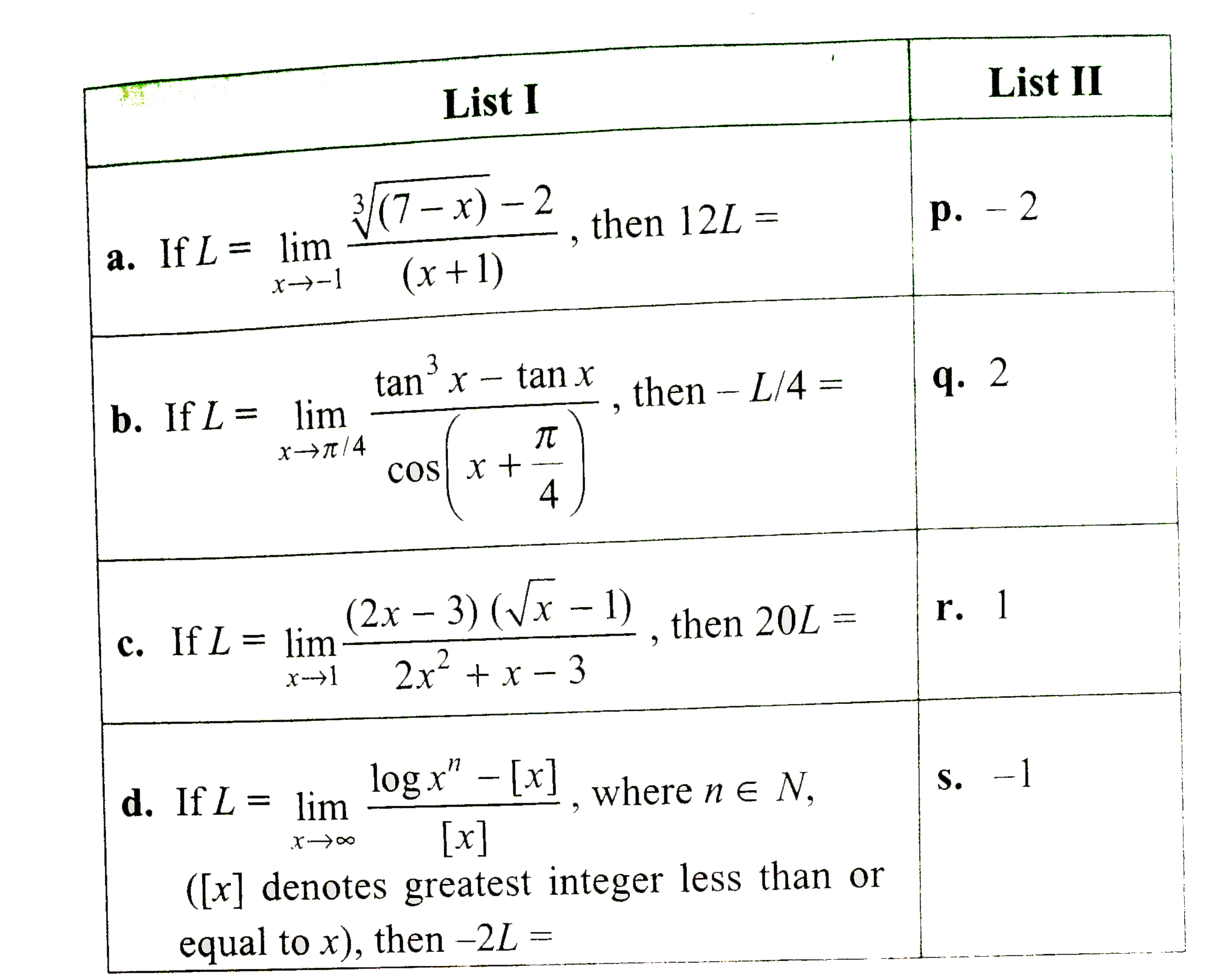Letf(x) be a polynomial satisfying limx→∞x2f(x)2x5+3=6 and f(1)=3,f(3)=7 and f(5)=11. Then
The value of f(0) isSolution in Bengali
The correct Answer is:D
Since limx→∞x2f(x)2x5+3=6 which is finite and non-zero, f(x) must be polynomial of degree '3'.
Also f(1)=3,f(3)=7 and f(5)=11
∴ f(x)=λ(x−1)(x−3)(x−5)+(2x+1)
⇒ limx→∞x2(λ(x−1)(x−3)(x−5)+2x+1)2x5+3=6
⇒ λ2=6
⇒ λ=12
∴f(x)=12(x−1)(x−3)(x−5)+(2x+1)
So, f(0)=12(−1)(−3)(−5)+1=−179
limx→1x−1sin(f(x)−2x−1)
=limx→1x−1sin[12(x−1)(x−3)(x−5)]
=limx→112(x−1)(x−3)(x−5)sin[12(x−1)(x−3)(x−5)].112(x−3)(x−5)
=196
Topper's Solved these Questions
- LIMITSBOOK - CENGAGE PUBLICATIONCHAPTER - LIMITSEXERCISE - Matrix Match Type
5 Videos
- LIMITSBOOK - CENGAGE PUBLICATIONCHAPTER - LIMITSEXERCISE - Numerical Value Type
26 Videos
- LIMITSBOOK - CENGAGE PUBLICATIONCHAPTER - LIMITSEXERCISE - Exercises (Single Correct Answer Type)
76 Videos
- JEE 2019BOOK - CENGAGE PUBLICATIONCHAPTER - JEE 2019EXERCISE - Chapter 10
8 Videos
- LINEAR COMBINATION OF VECTORS, DEPENDENT AND INDEPENDENT VECTORSBOOK - CENGAGE PUBLICATIONCHAPTER - LINEAR COMBINATION OF VECTORS, DEPENDENT AND INDEPENDENT VECTORSEXERCISE - DPP 1.2
10 Videos
Similar Questions
Match the following lists:

View SolutionThe reciprocal of the value of: limn→∞(1−122)(1−132)(1−142)(1−1n2)is
View Solutionlimx→0[sin(sgn(x))(sgn(x))], where [.] denotes the greatest integer function, is equal to
View SolutionIf y = y(x) is the solution of the differential equation, xdydx+2y=x2 satisfying y(1) = 1, then y(12) is equal to
View SolutionThe number of integral values of p for which (p+1)ˆi−3ˆj+pˆk,pˆi+(p+1)ˆj−3ˆk and −3ˆi+pˆj+(p+1)ˆk are linearly dependent vectors is q
View SolutionIf f(x) is a polynomial function satusfying the condition f(x)*f((1)/(x))=f(x)+f((1)/(x))and f(2)=9 then (1)2(f(4)=3f(6)(2)14f(1)=f(3)(3)9f(3)=f(5)(4)f(10)=f(11)
View SolutionLet f(x) be continuous functions f:R→R satisfying f(0)=1andf(2x)−f(x)=x. Then the value of f(3) is 2 b. 3 c. 4 d. 5
View SolutionLet f(x) is a cubic polynomial with real coefficients, x∈R such that f''(3)=0, f'(5)=0 . If f(3)=1 and f(5)=−3 , then f(1) is equal to-
View SolutionLet f(x) be a polynomial such that f(0)=2,f'(0)=3andf''(x)=f(x)andf'(4)=5α+12β,f(2)=5γ−12δ then
View SolutionLet f(x) be a polynomial satisfying lim_(x rarr oo)(x^(2)f(x))/(2x^(5)+3)=6, also f(1)=3,f(3)=7 and f(5)=11, then find the value of ((f(6)+5f(4))/(29))
View SolutionLetf(x) be a polynomial satisfying limx→∞x2f(x)2x5+3=6 and f(1)=3,f(3)=7 and f(5)=11. Then
The value of f(0) is
View SolutionLetf(x) be a polynomial satisfying limx→∞x2f(x)2x5+3=6 and f(1)=3,f(3)=7 and f(5)=11. Then
limx→1x−1sin(f(x)−2x−1) is equal to
View SolutionLetf(x) be a polynomial satisfying limx→∞x2f(x)2x5+3=6 and f(1)=3,f(3)=7 and f(5)=11. Then
The value of f(0) is
View SolutionIf limx→∞f(x) exists and is finite and nonzero and if limx→∞{f(x)+3f(x)−1f2(x)}=3, then the value of limx→∞f(x) is _______.
View SolutionLet f:R→R be a positive, increasing function with
limx→∞f(3x)f(x)=1. Then limx→∞f(2x)f(x) is equal to
View SolutionLet f(x) be a polynomial satisfying f(0)=2 , f'(0)=3 and f''(x)=f(x) then f(4) equals
View Solution
